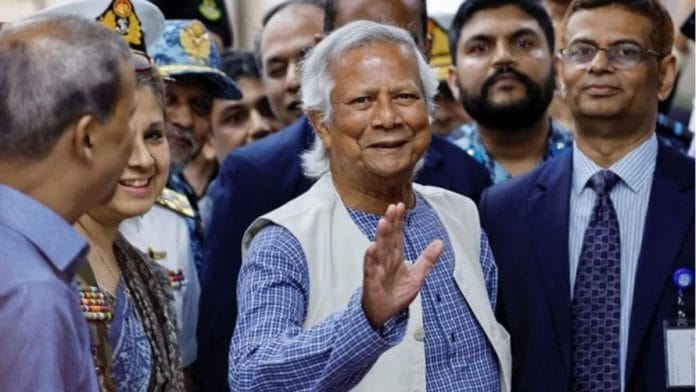New Delhi: Journalists in Dhaka have decried the “unprecedented” restrictions on freedom of the press in Bangladesh after the interim government revoked the press accreditations of 167 journalists, including senior editors, in a series of notifications. The latest notification came last week and more are in the offing, ThePrint has learnt.
Journalists in Dhaka confirmed to ThePrint that the accreditation is mandatory to access government offices and the secretariat for reporting. They expressed apprehension that more of them could face such action from the government. Some lamented that reporters who used to cover the prime minister’s office under Sheikh Hasina and her Awami League had been “sanctioned” by the interim government.
Senior journalists in Dhaka said the interim government was planning more such notifications, expanding the list of journalists who could lose access to the secretariat and other important government institutions.
The first notification, issued on 29 October, cancelled the permanent and temporary accreditations of 20 journalists, while the second, on 3 November, did so for 29 more. The third, issued on 7 November, cancelled the accreditations of 118 journalists.
The notifications, seen by ThePrint, were issued by the Press Information Department under Bangladesh’s Ministry of Information and Broadcasting and signed by chief information officer (CIO) Md. Nizamul Kabir. Action was taken based on sections 6.9, 6.10, 9.5 and 9.6 of the Press Accreditation Principle-2022, the notifications said.
ThePrint has reached out to the CIO over WhatsApp for the reason for the revocations. This story will be updated if and when he responds.
‘Unprecedented’ in Bangladesh
Senior journalists who have followed politics and governments in Bangladesh said this was an “unprecedented” restriction on the freedom of the press.
Pulack Ghatack, a well-known independent journalist, condemned the government order on Facebook. He said such restrictions were not enforced even when Bangladesh was under military rule.
He further wrote that more than 31 of those whose names were there on the third list were leading journalists from major news outlets, including 22 at the editor level. Nine of them were editors from smaller organisations or online platforms. The list also included several active reporters.
Another journalist from Dhaka said what made it more “shocking” and “terrifying” was the fact that journalists who had spent just a few years in the profession had also been named on the list.
“There are some reporters who have spent less than a decade in this profession who have been barred by the government. This is unfortunate because even the unsaid allegations of banning them because of their allegiance to Hasina and her party can’t be achieved at such a young age,” a senior journalist told ThePrint requesting anonymity, citing a lack of authority to speak on the issue.
Another journalist identified at least a dozen reporters in the third list who wrote about Hasina’s PMO and her party.
Two of them are Ali Asif Shaon and Nurul Islam Hasib of the leading national English daily Dhaka Tribune, who according to journalists who know them covered the politics and policy of Bangladesh.
Journalists who covered the Awami League such as Animesh Kar (Independent TV), Jhorna Moni (Dainik Bhorer Kagoj), and Bhaskar Bhaduri (Jamuna TV), as well as those who wrote about the PMO or both the PMO and Awami League such as Channel I’s Niladri Shekhar and Rizvi Newaj (Channel I), Dainik Desh Rupantor’s Ummul Wara Sweety and Pavel Haider, Raju Hamid (Nagrik TV), and Ahmed Pipul (N TV) were on the third list.
The first list, too, included several high-profile journalists.
Among others, it named former director general of the Press Institute of Bangladesh (PIB) Zafar Wazed, former press minister at the Bangladesh High Commission in New Delhi Shaban Mahmud, Ekattor TV’s chief editor Mozammel Haque, head of news Shakil Ahmed, and special correspondent Farzana Rupa, editor of Bangladesh Pratidin Naem Nizam, editor of Dhaka Times Mohammad Arifur Rahman, former managing director and chief editor of the news agency Bangladesh Sangbad Sangstha (BSS) Abul Kalam Azad, and editor of DBC News Pronab Saha.
In the second list, the government stripped Mohammad Abed Khan of Daily Jagaran, Manzurul Islam of DBC News, Md Omar Faruque of BSS, and Masuda Bhatti of Daily Amader Arthoneeti, among others, of their press accreditation.
(Edited by Sanya Mathur)
Also Read: Bangladesh recalls envoy to India, 4 others as bilateral ties with New Delhi remain tense






